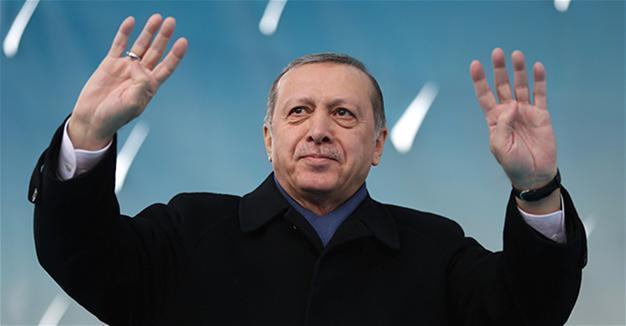Europe will drown in its own fears: President Erdoğan
AFYONKARAHİSAR

Europe will “drown in its own fears of Muslims and migrants,” Turkish President Recep Tayyip Erdoğan said on March 15, further hardening his tone just hours after an exchange of words between Ankara and Brussels on the future of a refugee deal.
Addressing a crowd in the western province of Ayfonkarahisar, Erdoğan said the “specter of fascism is roaming” on the streets of Europe, comparing the treatment of non-Europeans there to that of the Jews in World War II.
“Europe is heading toward being drowned in its own fears,” he said, referring to the rise of the far right in the continent over the last years.
“Turkophobia is mounting. Islamophobia is mounting. They are even scared of migrants who take shelter. They are scared of everything that is not from there. They are hostile to everything that is not from there,” Erdoğan said.
The blocking of Turkish ministers by the Dutch authorities last weekend was followed by protests in Rotterdam, with local police using horses and dogs to disperse demonstrators. The images were widely reported in the Turkish press and prompted an angry reaction from the government.
In an interview late on March 14, Turkish EU Minister Ömer Çelik said he believed the time had come for Turkey to reassess its migration agreement with the European Union, as it had “become clear that the EU is not following through on its promise” to grant Turks visa-free travel.
The row has called into question the landmark agreement last year, in which Turkey promised to stop migrants and refugees using the country as a route to the European Union, in return for EU aid for the displaced people taking shelter in Turkey and the promise of visa-free travel to the bloc.
“It has emerged that the EU has not kept its word. I am saying this personally: Turkey does not have any obligation to the other side concerning the implementation of this deal. Hence it can reassess it when it wants and in the way it wants. I think the time has come to review it,” Çelik said.
Progress on the issue has been held up by legal wrangling. Brussels says Ankara needs to narrow its anti-terror laws to meet EU standards, while Turkey says it needs the laws in their current form to combat multiple security threats.
“Their request for us to relax our terror legislation when they are broadening theirs has nothing to do with objectivity and justice. Under these conditions we cannot relax our terror legislation,” Çelik added.
However, the European Commission said it remained committed to the deal and expected Turkey to comply as it was in their mutual interest.
“We remain committed to the spokeswoman application of the EU-Turkey [agreement],” the Commission’s spokeswoman stated. “This is a contract of mutual trust and delivery, we expect that both parties to comply with their commitments.”
This deal has given the EU badly-needed breathing space after more than a million people - mostly fleeing conflict in Syria and elsewhere in the Middle East - fled to the bloc in 2015-16 via Turkey, Greece and the Balkans.
The European Union’s top officials sharply criticized Turkey on March 15 for accusing EU states Germany and the Netherlands of “fascism,” saying the charges were driving Ankara further away from its goal of joining the bloc.
“Rotterdam... totally destroyed by the Nazis, which now has a mayor born in Morocco: If any anyone sees fascism in Rotterdam they are completely detached from reality,” European Council President Donald Tusk told the European Parliament.
Tusk’s remarks were echoed by the head of the executive European Commission, Jean-Claude Juncker, who told parliament he was “scandalized” by the Turkish accusations.
“This is totally unacceptable and the one who is doing this is taking distance from Europe and not trying to enter the European Union,” Juncker said.
Erdoğan has repeatedly accused Germany and the Netherlands of behaving like “Nazis,” comments that have left The Hague and Berlin aghast.
He also brought up the Srebrenica massacre of 1995, where Dutch U.N. peacekeepers failed to prevent the killing of 8,000 Bosnian Muslims by Bosnian Serbs.
On March 15, Erdoğan accused the Netherlands of shutting one eye to the massacring over 8,000 Bosnian Muslims at Srebrenica. “These are the people who murdered around 8,000 Bosnian Muslims in Bosnia-Herzegovina. We know their character,” he said.
 Europe will “drown in its own fears of Muslims and migrants,” Turkish President Recep Tayyip Erdoğan said on March 15, further hardening his tone just hours after an exchange of words between Ankara and Brussels on the future of a refugee deal.
Europe will “drown in its own fears of Muslims and migrants,” Turkish President Recep Tayyip Erdoğan said on March 15, further hardening his tone just hours after an exchange of words between Ankara and Brussels on the future of a refugee deal.